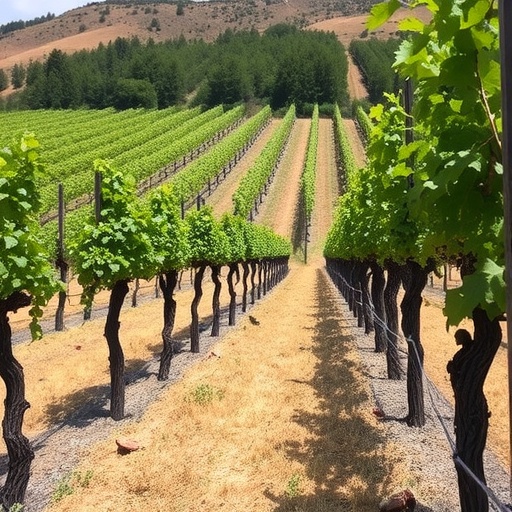Mediterranean vineyards, vital for agricultural economies and cultural heritage, are facing escalating threats from intense rainfall and soil degradation. The persistent challenge of topsoil erosion in these sloping terrains jeopardizes not only the productivity of the vineyards but also the long-term viability of the soil ecosystem. Recent groundbreaking research spearheaded by scientists at the University of Aveiro in Portugal uncovers a promising solution: the application of biochar, a carbon-rich material derived from pyrolyzed plant waste, which significantly enhances soil conservation and water retention capabilities.
Published in the prestigious journal Biochar, this study marks a pioneering effort to evaluate biochar’s influence on what researchers term the “soil sponge function” within Mediterranean vineyard environments. Over an 18-month period, the team conducted an experimental assessment utilizing outdoor lysimeters—large soil containers—that replicated the natural vineyard soil conditions on sloped land. In these controlled settings, half the lysimeters were enriched with a 4 percent biochar amendment produced specifically from pine wood chips, enabling a direct comparison with standard untreated vineyard soils under true climatic conditions.
The results were nothing short of remarkable. Soils treated with biochar exhibited a dramatic 45 percent reduction in surface runoff during rainfall events, directly mitigating the intensity of water flow that commonly dislodges topsoil particles. More strikingly, overall soil erosion in biochar-amended plots was reduced by two-thirds in comparison to controls, with erosion rates plummeting from 11.1 tons per hectare per year to just 3.7 tons. This substantial diminution in soil loss has profound implications for maintaining soil fertility and preventing landscape degradation in sensitive vineyard areas.
Key to these effectiveness mechanisms is biochar’s unique physicochemical structure. With a highly porous architecture and coarse particle size, biochar augments soil texture by creating additional pore spaces that lower bulk density by approximately 7 percent. This modification not only helps alleviate compaction but also tangibly improves water infiltration rates by an impressive 28 percent. By enhancing the soil’s permeability, biochar enables more effective water absorption, thereby promoting deeper moisture penetration rather than rapid surface runoff.
The study further highlighted biochar’s critical function in buffering periods of drought, a characteristic stress of Mediterranean climates where extended dry spells alternate with sporadic heavy rains. During these dry intervals, biochar-amended soils demonstrated the capacity to store up to threefold the volume of water compared to untreated soils. This capacity to retain moisture ensures sustained availability for grapevines during critical growth phases, reducing irrigation demands and bolstering resilience against climate variability.
Lead author Behrouz Gholamahmadi from the University’s Centre for Environmental and Marine Studies (CESAM) described biochar’s role as analogous to a ‘sponge’ embedded in soil matrices, capable of absorbing and gradually releasing rainfall. This gradual release mechanism prevents sudden surges in surface runoff, consequently preserving nutrient-rich topsoil and nurturing the complex microbial and chemical processes necessary for healthy vineyard soils. The study implanted a strong biological framework connecting soil physical characteristics with ecosystem services vital to sustainable viticulture.
Co-author Frank Verheijen emphasized the vulnerability of Mediterranean vineyard soils, which, due to their steep slopes and frequent exposure, are often the first to succumb to erosion under intense rainfall patterns exacerbated by climate change. The researchers advocate that biochar application emerges as a vital climate-smart management strategy that not only strengthens soil integrity but also supports long-term agricultural productivity by reinforcing the soil’s natural defense against erosion and water stress.
From a technical perspective, the enhanced infiltration and water retention effects stem from the hydrophobic yet highly porous surfaces of biochar particles, which create microhabitats conducive to improved soil moisture dynamics. This dual functionality supports a better balance between water retention during dry periods and drainage during wet seasons, aligning with natural hydrological cycles and minimizing anthropogenic disruption of soil-water interactions.
The researchers recommend filling existing knowledge gaps by tracking biochar’s performance across full hydrological cycles to capture the nuances of seasonal changes and extreme weather events, commonly referred to as atmospheric river phenomena. Continued research integrating biochar application with other sustainable soil conservation methods, such as cover cropping and mulching, could unlock synergies that further amplify its benefits for Mediterranean agricultural landscapes under pressure.
Beyond improving erosion control and water efficiency, the incorporation of biochar into vineyard soils also resonates with broader environmental imperatives. As a product of biomass conversion, biochar sequesters carbon in stable forms for extended periods, contributing to climate change mitigation by locking atmospheric carbon into the soil. This dual role promotes a circular bioeconomy model that aligns agricultural management with global sustainability goals.
Ultimately, this pioneering research underscores biochar’s exceptional promise as a transformative intervention capable of preserving fragile Mediterranean soils amidst mounting environmental challenges. By prioritizing its integration into vineyard management practices, stakeholders can safeguard soil health, enhance water use efficiency, and fortify agricultural resilience against the escalating impacts of climate change and land degradation.
The implications of this study extend far beyond Mediterranean viticulture, offering a replicable blueprint for similar erosion-prone agricultural regions worldwide. As soil conservation garners renewed attention within the global scientific and policy arenas, biochar stands out as an innovative, multi-functional amendment that could revolutionize approaches to sustainable land stewardship in the 21st century.
Subject of Research: Not applicable
Article Title: Soil conservation benefits of biochar in Mediterranean vineyards: enhancing the soil sponge function and mitigating water erosion
News Publication Date: 8-Sep-2025
Web References:
– DOI link: http://dx.doi.org/10.1007/s42773-025-00483-x
– Biochar journal: https://link.springer.com/journal/42773
References:
– Gholamahmadi, B., Ferreira, C.S.S., Gonzalez-Pelayo, O. et al. Soil conservation benefits of biochar in Mediterranean vineyards: enhancing the soil sponge function and mitigating water erosion. Biochar 7, 106 (2025).
Image Credits:
– Behrouz Gholamahmadi, Carla S. S. Ferreira, Oscar Gonzalez-Pelayo, Ana Catarina Bastos & Frank G. A. Verheijen
Keywords:
– Ecosystem services
– Environmental engineering
– Civil engineering
– Soil chemistry
– Environmental chemistry
– Soil science




